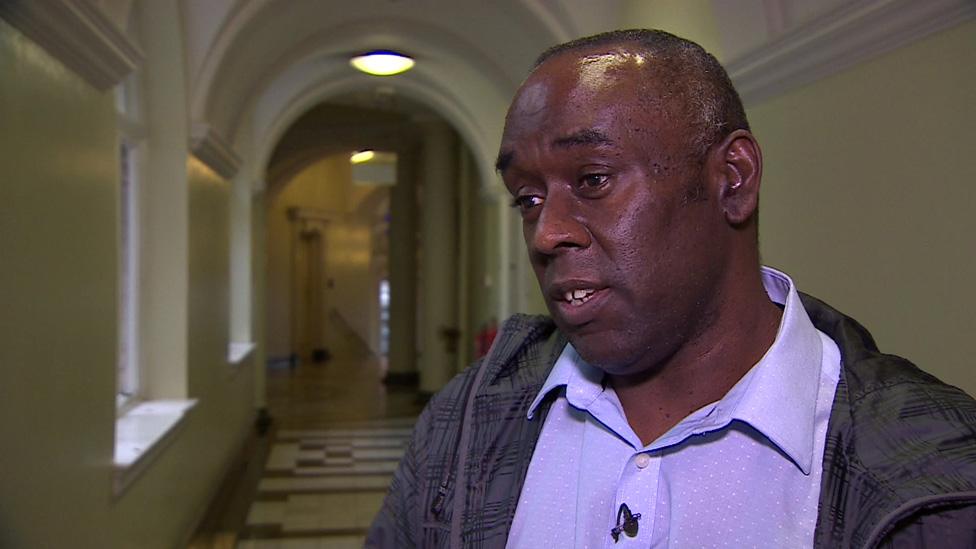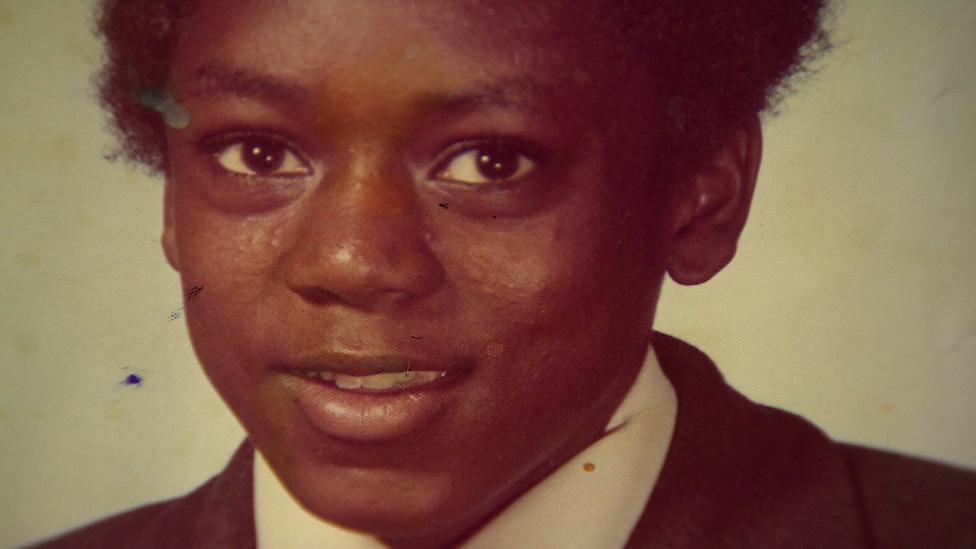Turning the tables on child abuse
- Published
Raymond Stevenson: "We are unstoppable."
A chance meeting between two men who realised they had both been abused in the same Surrey children's care home has led to a campaign that has seen hundreds of former residents alleging they were also victims of physical, emotional and sexual abuse.
Music producer Raymond Stevenson, physically abused during his time at the Shirley Oaks home in the 70s, met a childhood friend last year who revealed he'd been raped at the institution. Within a few months, the Shirley Oaks Survivors Association (SOSA) was hundreds strong.
"At the very first meeting I can remember there was lots of hugging lots of crying - it was really we are together now, they can't harm us again," Stevenson recalls. "No lies can penetrate our lives because we feel we were going to reveal the truth."
The south London production office, from where Stevenson promoted music stars like Jessie J, now looks more like a police incident room. A map on the wall includes details of allegations from hundreds of former residents, suggesting physical, sexual and emotional abuse was routine at many of the houses on the 72-acre Shirley Oaks site.
"We have been in contact with over 300 people and the stories we are getting are just horrific," Stevenson says. "Every time we interview someone and hear about what happened to them, it brings tears to our eyes. Reliving some of the horrors they went through again hasn't been easy."
There have been two major police investigations into abuse at children's homes in South London and three people including a swimming instructor, William Hook, have been convicted of offences relating to Shirley Oaks.
Another operation is currently on-going, but SOSA have lost faith in the authorities who they claim have covered-up the true scale of abuse at Shirley Oaks. "We don't trust them and that's why we have decided to do this campaign ourselves," Stevenson explains.
The Shirley Oaks campaigners are part of a wider phenomenon - a "survivor" activism that is changing the balance of power in relation to child abuse. Where once victims were ignored or silenced, now they are coming together, often through social media, forming support groups and building a crescendo of noise that the authorities are forced to acknowledge.
A couple of weeks ago, dozens of former Shirley Oaks residents crowded into a Lambeth council meeting - the authority which ran the home until its closure in the mid-1980s. Councillor after councillor spoke of their shame at what had been allowed to happen to children in their care.
"I feel angry, genuinely appalled and truly sad to be the leader of a council, Lambeth Council, that in the past enabled such terrible acts of abuse, against some of our young people", council leader Lib Peck told the meeting as victims in the public gallery clapped.
Among them was the award-winning author Alex Wheatle who has written about the sexual abuse he suffered as a child at Shirley Oaks.

"We have not come here, to go to war with the council, we have come here to gain your support," Wheatle told the meeting.
Afterwards he reflected on how far the campaign had come. "It was so strengthening to see my brothers and sisters who I grew up with, one by one, presenting their case, presenting their stories," he said. "You know, I've got such a love for them right now I just want to hug everyone right now ... how brave are they?"
The Shirley Oaks association is doing more than compiling evidence. It is using music to press its case. A song entitled "Don't Touch It - It's Mine" includes personal testimony from victims.
"I was abused mentally, physically emotionally and violently," the track begins. "Of the original 16 of us, 12 have killed themselves," another haunting voice relates as a video shows child actors playing around what were the Shirley Oaks buildings.

Author Alex Wheatle as a child
"We not going to be told lies anymore," Stevenson explains. "We are not going to leave it in the hands of lawyers, politicians or council officials to tell us what happened to us. We want to discover it ourselves and we know music and dance and poetry are ways that can tell a greater story."
The Shirley Oaks Survivors Association is considering whether to give its dossier of evidence to the independent Goddard inquiry but they do believe, whatever happens, the tables have turned.
"There was a bond between us and that has come to haunt these people, those who done it," Raymond Stevenson says. "It is the unity of the Shirley Oaks 'massive' as we call ourselves, and the other children's homes coming together, that has built this power base and we are unstoppable."

If you have been affected, the following organisations can help:
The police if you have evidence of having suffered sexual abuse so an investigation can be made
NSPCC, external charity specialises in child protection
National Association for People Abused in Childhood, external offers support, advice and guidance to adult survivors of any form of childhood abuse
Childline, external is a private and confidential service for children and young people up to the age of 19
The Children's Society, external works to support vulnerable children in England and Wales